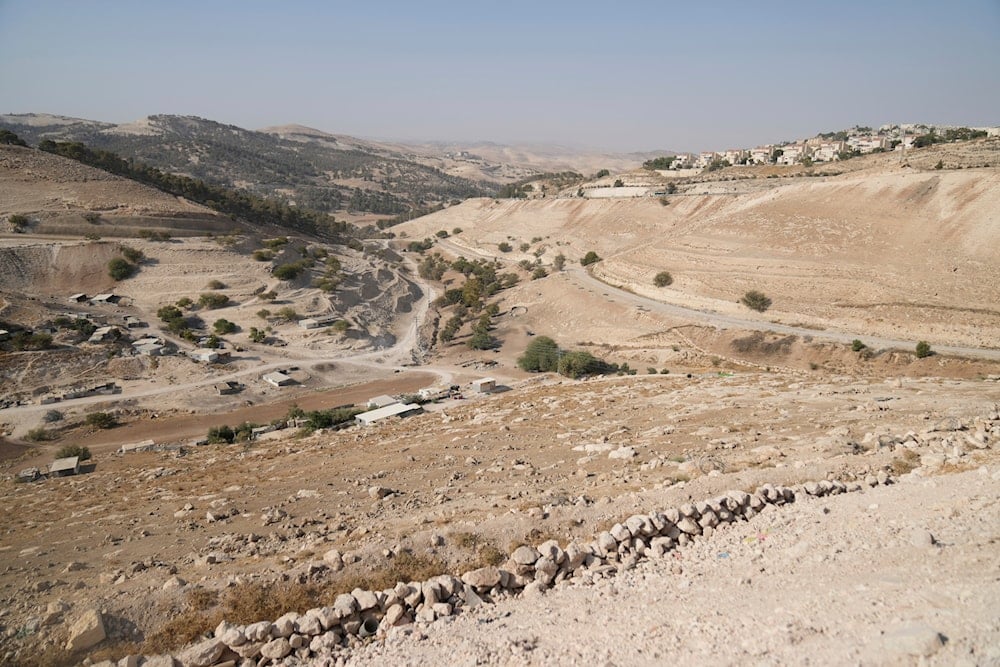Netherlands pushes settlement import ban amid EU scrutiny of 'Israel'
Despite pausing broader sanctions, the Netherlands is advancing legislation to ban imports from illegal Israeli settlements, amid growing EU pressure over occupation and Gaza violations.
-

A general view shows the E1 area, an open tract of occupied land east of occupied al-Quds, between the Israeli settlement of Maale Adumim, seen right, and the occupied West Bank town of Eizariya on August 14, 2025. (AP Photo/Nasser Nasser)
The Netherlands is moving forward with legislation to ban imports from illegal settlements in occupied Palestine, even as it temporarily halts its push for broader EU sanctions against "Israel" following last month’s ceasefire in Gaza.
Speaking to The Guardian during a regional visit, Dutch Foreign Minister David van Weel confirmed the legislation remains in progress. He said the move responds to intensified Israeli violence and the expansion of settlements, both of which have eroded the feasibility of a two-state solution.
“Now we deem it is not a time to increase sanctions on Israel because we want to see the peace plan implemented,” van Weel said. “At the same time, we’re not blind to any movements on the West Bank that might move the two-state solution further away.”
Five European Union states, Spain, Slovenia, Ireland, Belgium, and the Netherlands, have announced or initiated measures to curb trade with illegal settlements in the occupied West Bank, where settler and military violence has killed over 200 Palestinians this year, including at least 40 children.
Spain and Slovenia have already imposed bans on settlement exports, while Belgium and Ireland are in the legislative phase. Additionally, Spain and Belgium have suspended consular services for settlers.
Van Weel acknowledged that drafting the Netherlands’ legislation had proven difficult, citing EU trade policy constraints. “We cannot just stop [all imports from illegal settlements] immediately because there is currently no legal basis for that,” he said.
Surge in settler attacks and annexation push draws global concern
The move comes amid a dramatic increase in settler attacks across the West Bank. According to UN data, October recorded an average of eight Israeli assaults per day on Palestinian people, property, and agriculture, the highest since recordkeeping began nearly two decades ago. Many more incidents go unreported.
Tensions rose further last month when the Knesset gave preliminary approval to a bill that would apply Israeli law to the occupied West Bank, widely seen as a step toward formal annexation. Despite resistance from figures like Benjamin Netanyahu and Donald Trump, the bill signaled deepening political momentum toward annexation from within "Israel".
In June, nine EU member states, including Belgium, Spain, Sweden, and Ireland, urged the European Commission to explore ways to limit trade with settlements, citing the International Court of Justice’s advisory opinion that declared the occupation illegal. The ICJ further emphasized that third-party states have a legal duty not to assist in or recognize the occupation.
While trade from Israeli settlements represents only a small fraction of total EU-"Israel" commerce, diplomats say banning such trade would carry significant symbolic weight. The EU remains "Israel’s" largest trading partner, representing roughly one-third of its global trade volume.
Earlier this year, the Netherlands, long considered one of "Israel’s" closest allies in Europe, launched a landmark effort to review the EU-"Israel" association agreement, the legal framework that grants "Israel" tariff-free trade and participation in EU-funded programs like Horizon Europe.
An internal EU review concluded that "Israel" had violated the agreement’s human rights obligations. In September, the EU executive called for suspending trade privileges and imposing sanctions on two far-right Israeli ministers. Those measures were paused following the Trump-brokered ceasefire, but they remain under consideration.

 3 Min Read
3 Min Read











